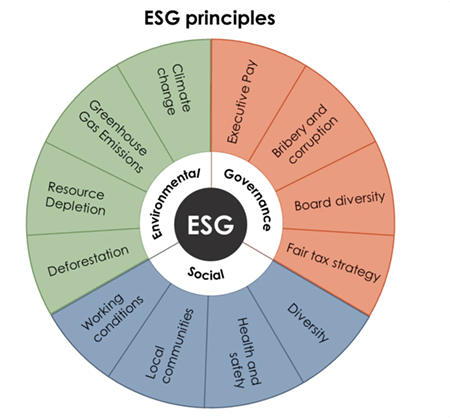ESG stands for Environmental, Social and Governance. In most cases, a business would refer to it as sustainability in their business model, for example, how its products and services contribute to sustainable development; however, it is about much more than that. It is also about a company’s risk management, so how it manages its own operations to minimise the negative impact on the environment. Getting your ESG strategy right can positively impact how your business is viewed by your employees, customers, suppliers, and shareholders.
The individual elements of ESG are:
Environmental
Anything a business produces and consumes has an impact on the environment. Climate change, greenhouse gas emissions, Carbon footprint, and resource depletion are just some of the impact measures. Businesses can look at various ways to reduce their impact, such as using renewable energy, evaluating their recycling and waste practices, researching greener alternatives and investing in technologies and infrastructure.
Social
All companies have a responsibility to their employees as well as their customers, suppliers and consumers in the markets they operate within. This includes, amongst others, employee treatment (pay/benefits/engagement), diversity and inclusion and having an ethical supply chain.
Governance
Governance serves as a control mechanism in relation to how the business is run. Areas reviewed include bribery and corruption, executive pay and internal control. This is important to the development of companies can be used to balance or align interests between stakeholders.
ESG is now an inescapable part of business, and the individual elements are intertwined. The below diagram shows the principles of ESG:

McKinsey & Company, 2019, identified five links of an ESG strategy to value creation, citing that the potential for value creation is too great to leave any of them unexplored.
1. Top-line growth
McKinsey & Company first state that a strong ESG proposition helps companies tap into new markets and expand into existing ones through providing environmentally friendly goods that customers both demand and are more likely to purchase.
2. Cost reductions
They suggest that ESG can also reduce costs substantially. Among other advantages, executing ESG effectively can help combat rising operating expenses, and through the use of implementing environmentally-friendly facilities throughout the business, you can significantly reduce utility costs, as well as demonstrate good practice.
3. Reduced regulatory and legal interventions
Furthermore, a stronger external-value proposition can enable companies to achieve more freedom from government pressure and power of the market but instead be provided with more opportunities for financial support.
4. Employee productivity uplift
In addition to the above, Mckinsey & Company claim that a strong ESG proposition can help companies attract and retain high calibre employees, which in turn enhances employee motivation by instilling a sense of purpose and increasing productivity overall.
5. Investment and asset optimisation
Finally, they put forward that a strong ESG proposition can improve ROI in the long term by providing by redirecting spend on more sustainable resources.
Attitudes and actions towards ESG are shifting; if businesses do not comply with regulations at the very least, then it can have a significant impact on their bank balance, especially in carbon-intense industries.
We’ve already witnessed bans on some of the more widely used single-used plastics and increased tax on diesel, but increased limitations and new constraints could find many businesses having to quickly get up to speed otherwise face large fines.
One way businesses can embrace the new change and get ahead of the curve is to consider your strategy now and potentially to find new uses for assets that are no longer serving their purpose. For example, McKinsey & Company suggest converting failing parking garages into uses with higher demand, such as residences or day-care facilities - something we’ve already started to see in up-and-coming areas in larger towns and cities.
Retailers who switch their card programmes from plastic to paperboard are already starting to make that change, Green Gift Cards have a fully traceable and accountable supply chain and are the only manufacturer in the marketplace that are certified plastic-free.




